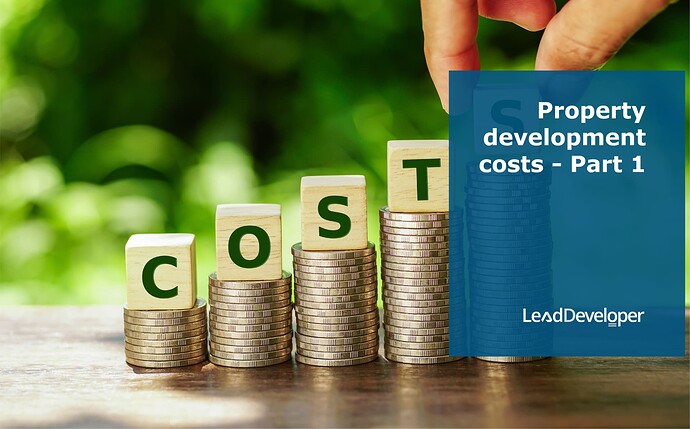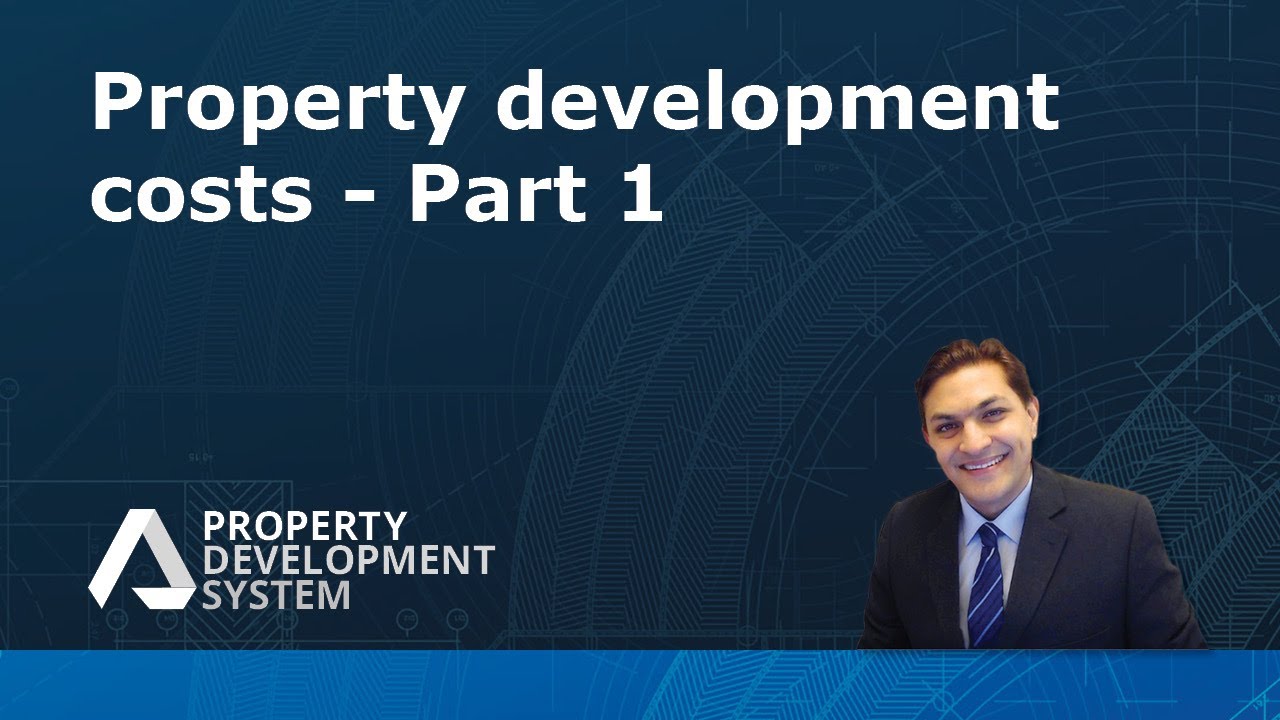Development Costs - Part 1
Here are various expenses associated with property development, particularly focusing on land acquisition, finance, and consultant fees:
Land Acquisition Costs
Includes purchase price, legal fees, stamp duty, buyer’s agent commission, and spotters fee.
Finance Costs
Comprises brokerage fee, establishment fee, valuation for the project, interest, annual fee, admin fee, and closure fees.
Consultants and Professionals
Involves expenses for 3D artist impressions, architectural drawings, town planning, working drawings for construction, civil and structural engineering, mechanical, electrical and hydraulic engineering, joinery, landscape, and a multitude of reports such as arborist, asbestos, heritage consultant, dilapidation, energy, environmental audit, land survey, fire engineer report, soil report by geotechnical engineer, and traffic management.
Insights based on numbers
Finance Costs
The video highlights a variety of finance-related costs, underlining the complexity and diversity of fees involved in securing funding for development projects.
Consultants’ Fees
A wide range of consultants and professionals are needed throughout the development process, each contributing unique expertise and incurring specific costs.
Frequently Asked Questions
What are the implications of varying soil reports on development costs?
Soil reports provided by a geotechnical engineer are crucial for determining the type of engineering required to build on different soils. The findings can significantly impact development costs since different soil types may require various engineering solutions to ensure structural stability. For instance, a soil report indicating a need for special foundations or additional land stabilisation can increase project expenses. These reports help assess the suitability of the land for development and plan the construction approach, thereby directly influencing the financial feasibility and overall budget of a development project.
In what ways can developers minimise finance-related costs in property development?
Shop Around for Financing
Comparing different financing options to find lower interest rates or more favourable terms.
Negotiate Fees
Engaging in negotiations with financial institutions or brokers to reduce or waive certain fees.
Efficient Project Management
Ensuring the project adheres to timelines and budgets can reduce the duration of loans needed, thereby decreasing interest payments.
Consider Alternative Financing
Exploring non-traditional financing options such as crowdfunding or partnerships that might offer more advantageous terms.
What are land acquisition costs?
Land acquisition costs include all expenses related to purchasing land for development. These costs encompass the purchase price of the land, legal fees involved in the transaction, stamp duty (a tax paid to the government for transferring ownership of the property), commission paid to a buyer’s agent for their services, and a spotters fee for identifying the property.
Why do I need to pay a buyer’s agent commission and a spotter fee?
A buyer’s agent commission is paid for the services of a professional who assists you in finding and purchasing land, negotiating the deal, and completing the purchase process. A spotters fee is paid to someone who identifies a potential development site for you. Both fees compensate these individuals or entities for their efforts and expertise in facilitating the land acquisition.
What comprises finance costs in property development?
Finance costs in property development include a variety of fees associated with securing funding for the project. These fees can include a brokerage fee for arranging the loan, an establishment fee for setting up the loan, valuation fees to assess the project’s worth, interest on the loan, annual fees, administrative fees, and closure fees when the loan is paid off or terminated.
Why are there so many different types of finance costs?
The diversity of finance costs reflects the complexity of arranging and managing funding for property development projects. Each fee covers different aspects of the loan process, from initiation to completion, including the cost of lending, managing the loan, and ensuring the project is financially viable.
What role do consultants and professionals play in property development?
Consultants and professionals provide specialised expertise necessary for planning, designing, and executing a property development project. Their services can include creating 3D artist impressions, architectural and town planning, preparing construction drawings, and conducting various engineering assessments (civil, structural, mechanical, electrical, and hydraulic). They also offer expertise in joinery, landscape design, and compiling reports required by law or needed for project planning (e.g., arborist, asbestos, heritage, dilapidation, energy, environmental audits, land surveys, fire engineering, soil reports by geotechnical engineers, and traffic management).
Why is it necessary to hire so many consultants and professionals for a development project?
Each consultant or professional provides a unique set of skills and knowledge that contributes to the successful completion of the development project. Their expertise ensures that the project is designed effectively, meets all legal and regulatory requirements, and is built to a high standard. Hiring a range of consultants and professionals helps mitigate risks, improve the project’s quality, and can ultimately save time and money by avoiding costly mistakes and delays.
How do finance costs and consultants’ fees impact the overall development project?
Finance costs and consultants’ fees significantly impact the overall cost of a development project. Understanding these costs is crucial for budgeting and financial planning. Finance costs can affect the project’s profitability, given that they can represent a substantial portion of the expenses. Similarly, consultants’ fees are necessary for ensuring the project meets all required standards and regulations, but they also add to the total costs. Effective management and negotiation of these costs are essential for the project’s financial success.
Test Your Knowledge
Multiple Choice Questions on Development Costs
1. What is included in the land acquisition costs for a property development project?
A) Brokerage fee and establishment fee
B) Purchase price, legal fees, stamp duty, buyer’s agent commission, and spotters fee
C) Annual fee, admin fee, and closure fees
D) Architectural drawings and town planning
2. Which of the following best describes finance costs in property development?
A) Costs associated with hiring consultants and professionals
B) Fees for 3D artist impressions and landscape design
C) Expenses related to securing funding for the project, including interest and various fees
D) Costs incurred from reports by arborists and heritage consultants
3. What role do consultants and professionals play in property development?
A) They assist in land acquisition by negotiating the purchase price
B) They provide specialised expertise needed for the planning, design, and execution of the project
C) They manage the financial aspects of the project, including loan arrangement
D) They are responsible for the payment of stamp duty and legal fees
4. Why is it necessary to pay a spotters fee during the land acquisition process?
A) It covers the cost of land valuation for the project
B) It is paid to someone who identifies a potential development site
C) It compensates for the annual fees associated with the loan
D) It is a mandatory tax imposed by the government
5. Which of the following is not a finance cost associated with property development?
A) Brokerage fee
B) Establishment fee
C) 3D artist impression fee
D) Valuation for the project
6. Why are a wide range of consultants and professionals needed throughout the development process?
A) To ensure the project is financially viable and meets budgetary constraints
B) Each offers unique expertise contributing to the project’s success, from design to compliance with regulations
C) To negotiate better terms on finance costs and loans
D) To manage the purchase and sale of land involved in the project
7. Which expense is specifically associated with ensuring the project adheres to environmental standards?
A) Brokerage fee
B) Landscape design
C) Environmental audit
D) Closure fees
Answers:
- B) Purchase price, legal fees, stamp duty, buyer’s agent commission, and spotters fee
- C) Expenses related to securing funding for the project, including interest and various fees
- B) They provide specialised expertise needed for the planning, design, and execution of the project
- B) It is paid to someone who identifies a potential development site
- C) 3D artist impression fee
- B) Each offers unique expertise contributing to the project’s success, from design to compliance with regulations
- C) Environmental audit
Assignment
Practical Exercise: Analyzing Development Costs
Objective:
This exercise aims to deepen your understanding of the various expenses associated with property development, focusing on land acquisition, finance, and consultant fees. You will apply this knowledge by creating a detailed development cost plan for a hypothetical project.
Instructions:
You are tasked with planning a small residential development project. Assume you have identified a parcel of land you intend to purchase and develop into a residential complex with 10 units. Your task is to estimate the development costs based on the information provided in the “Development Costs - Part 1” overview. Use the following guidelines for your project plan:
Land Acquisition Cost Estimation:
- Research the average land prices in your chosen area for residential development.
- Estimate the legal fees, stamp duty, buyer’s agent commission, and spotters fee. Assume these fees are a percentage of the land purchase price (use local rates where available or assume rates).
- Create a detailed breakdown of all land acquisition costs.
Finance Cost Analysis:
- Determine the total project cost estimate (including land acquisition, construction, and consultancy fees).
- Based on the total project cost, estimate the finance costs. Assume you will finance 70% of the total project cost through a loan.
- Calculate the brokerage fee, establishment fee, interest (assume a rate and loan term), annual fee, admin fee, and closure fees. Provide a yearly breakdown of these costs over the term of the loan.
Consultants and Professional Fees:
- For each type of consultant and professional listed (3D artist impressions, architectural drawings, town planning, etc.), estimate their fees. You may conduct brief online research to find average rates or percentages typically charged for residential development projects.
- Summarise the total expected cost for hiring all required consultants and professionals.
Overall Project Cost Summary:
- Combine all costs (land acquisition, finance, and consultant fees) to provide an overall project cost estimate.
- Discuss the potential impact of these costs on the project’s feasibility and profitability.
Research and Reflection Questions:
- How do land acquisition costs vary by location, and what factors influence these costs?
- What strategies can be employed to minimise finance-related expenses in development projects?
- Reflect on the importance of consultants and professionals in ensuring the success of a development project. Are there areas where costs could be minimised without compromising quality?
To Do:
- Submit a report that includes your cost estimates, calculations, and answers to the research and reflection questions.



